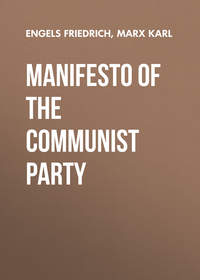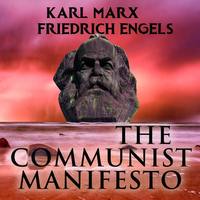 полная версия
полная версияLandmarks of Scientific Socialism: "Anti-Duehring"
The value idea is the most universal and the most comprehensive expression of the economic conditions of the production of commodities. In the idea of value there is not only the germ of gold but also of those more highly developed forms of commodity production and exchange. Since value is the expression of the social labor incorporated in individual products, there lies the possibility of a difference between this and the individual labor embodied in the same product. This difference becomes very apparent to a private producer who abides by an old fashioned method of production while the social method of production has taken a step forward. It then appears that the sum of all the private manufacturers of a given commodity produce an amount in excess of the social needs. Then, since the value of a commodity is expressed only in terms of other commodities and can only be realised in exchange with them, the possibility arises that either exchange will cease or that the commodity will not realise its full value. Finally, the specific commodity labor-force finds its value like that of other wares in the social labor time necessary for its production. In the value form of the product there is already in embryo the entire capitalistic form of production, the antagonism between the capitalists and the wage-workers, the industrial reserve army, the crisis. The capitalistic system will be abolished by the restoration of true value (just as Catholicism will be abolished by the restoration of the true Pope), or by the restoration of a society in which the producer finally dominates his product, by the doing away of an economic category which is the most comprehensive expression of the slavery of the producer to his own product.
When the society producing commodities has developed the inherent value form of the commodities, as such, to the gold-form, various germs of value hitherto hidden thereupon begin to sprout. The next substantial step is the generalising of commodity forms. Gold makes objects directly produced for use into commodities by driving them into exchange. Thereupon the commodity and the gold smite the community which is engaged in social production, break one social tie after another and finally dissolve the society into a mass of private producers. Gold establishes, as in India, individual cultivation of the land in the place of communal cultivation, then it destroys the system of regular distribution of communal lands among individuals and makes ownership final, and lastly it leads to the division of the communal wood land. Whatever other causes arising from the industrial development may work along with it, gold is always the most powerful instrument for the destruction of the communal society.
The State, the Family, and Education(Herr Duehring says "In the free society there will be no religion, since, in all its degrees, it tends to destroy the originality of the child, in that it places something above nature or behind it, which may be affected by means of works or prayers" also "a properly constituted socialist state will do away with all the paraphernalia of spiritualistic magic, and all the actual forms of religion." Engels proceeds – )
Religion will be forbidden. Now, religion is nothing but the fantastic reflection in men's minds of the external forces which dominate their every day existence, a reflection in which earthly forces take the form of the super-natural. In the beginning of history it is the forces of nature which first produce this reflection and in the course of development of different peoples give rise to manifold and various personification. This first process is capable of being traced, at least as far as the Indo-European peoples are concerned, by comparative mythology, to its source in the Indian Vedas and its advance can be shown among the Indians, Greeks, Persian, Romans, and Germans, and, as far as the material is available, also among the Celts, Lithuanians, and Slavs. But, besides the forces of nature, the social forces dominated men by their apparent necessity, for these forces were, in reality, just as strange and unaccountable to men as were the forces of nature. The imaginary forms in which, at first, only the secret forces of nature were reflected, became possessed of social attributes, became the representatives of historical forces. By a still further development the natural and social attributes of a number of gods were transformed to one all-powerful god, who is, on his part, only the reflection of man in the abstract. So arose monotheism, which was historically the latest product of the Greek vulgar philosophy, and found its impersonation in the Hebrew exclusively national god, Jahve. In this convenient, handy and adaptible form religion can continue to exist as the direct, that is, the emotional form of the relations of man to the dominating outside, natural, and social forces, as long as man is under the power of these forces. But we have seen over and over again in modern bourgeois society that man is dominated by the conditions which he has himself created and that he is controlled by the same means of production which he himself has made. The fundamental facts which give rise to the reflection by religion therefore still persist and with them the reflection persists also. And just because bourgeois economy has a certain insight into the relations of the original causes of this phenomenon, it does not alter it a particle. Bourgeois economy can neither prevent crises, on the whole, nor can it stop the greed of the individual capitalists, their disgrace and bankruptcy, nor can it prevent the individual laborers from suffering deprivation of employment and poverty. Man proposes and God (to wit, the outside force of the capitalistic method of production) disposes. Mere knowledge even though it be broader and deeper than bourgeois economics is of no avail to upset the social forces of the master of society. That is fundamentally a social act. Let us suppose that this act is accomplished and society in all its grades freed from the slavery to the means of production which it has made but which now dominate it as an outside force. Let us suppose that man no longer merely proposes but that he also disposes. Under such conditions the last vestiges of the external force which now dominates man are destroyed, that force which is now reflected in religion. Therewith, the religious reflection itself is destroyed owing to the simple fact that there is nothing more to reflect.
But Herr Duehring cannot wait until religion dies a natural death. He treats it after a radical fashion. He out Bismarcks Bismarck, he makes severe "May laws" not only against Catholicism but against all religion. He sets his gendarmes of the future on religion and thereby gives it a longer lease of life by martyrdom. Wherever we look we find that Duehring's socialism has the Prussian brand.
After Herr Duehring has blithely got rid of religion he says "Man can now, since he is dependent upon himself and nature alone, intelligently direct the social forces in every way which open to him the course of things and his own existence." Let us look for a little while at that course of things to which the self-reliant human can give direction.
The first in the course of things by which man becomes self-reliant is being born. Then during the time of his immaturity his education is in the hands of his mother. "This period may, as in the old Roman law, reach to the age of puberty, that is to about fourteen years of age." Only where the older boys do not respect the authority of the mother does the father's assistance play a part and the public method of education robs this of all harm. With puberty the boy comes under the natural care of his father, where this is exercised in a truly fatherly manner, in other cases society takes charge of his education.
As Herr Duehring has already maintained the position that it is possible to convert the capitalistic methods of production into social methods without disturbing the mode of production itself, so he here seems to think that one can separate the modern bourgeois family from its entire economic foundations without any change in the whole form of the family. This form is so permanent in his estimation that he thinks of the old Roman jurisprudence, in an "improved" form, as the model of the family for ever, and he does not conceive of the family otherwise than as a permanent unit. The Utopists have the superiority over Herr Duehring here. In their estimation a really free mutual condition would arise in all the family relations as a result of the free association and the public ownership of the instruments of production together with the institution of a system of public education. And Marx has shown furthermore in his "Capital" how "the greater industry, which takes widows, young persons and children of both sexes from the home, and employs them in organized social productive processes, lays the foundation for a higher form of the family and better conditions for people of both sexes."
LANDMARKS OF SCIENTIFIC SOCIALISM
APPENDIX
The foregoing pages will have given the reader some idea of the infinite care which Engels expended in order to keep abreast of the chief scientific discoveries of his times. He was as painstaking as a genius. On the other hand, his modesty was almost absurd, for he never ventured to claim anything for himself, and such ability as was displayed in the laying of the economic political foundations of the socialist movement was invariably credited by him to the superior talent and comprehension of Marx.
There is no question that the work constitutes a most effective reply to the arguments of Duehring, with whom, poor fellow, we need no longer trouble ourselves. It constitutes, moreover, a very formidable answer to all those who seek for a justification of the socialist movement in those abstract conceptions which the average man finds it so hard to escape. In fact, so removed is the point of view of the writer of the foregoing pages from that of the man in the street that it is doubtful whether it is possible for more than a comparatively few students thoroughly to grasp the significance of the dialectic and to apply it in a satisfactory and effective fashion. Still, there is no question that this understanding of the socialist movement, as a movement, is absolutely required of all who can be considered as taking an intelligent and useful attitude with regard to social and political questions.
The possession of this key gave the two founders of the modern socialist movement such a comprehension of the tendencies of modern civilization as enabled them to make those economic and political predictions which have been so completely fulfilled.
There is little need to call attention to the fact that much of Engels' argument is now antiquated in face of the growth of science and the almost incredible development of mechanical invention and the material progress consequent upon it. It could not have been otherwise. The wonders of Engels' day are the commonplaces of our existence. The machines, which he considered so wonderful and so change-compelling have already been "scrapped" for new machines of greater power and capacity for production. The remark that the battleship had in his time arrived at a point where it was as expensive as it was unfit for fighting sounds almost ridiculous in face of the tremendous development of the engines of naval warfare since he wrote, and the invention and use of the submarine. Still it must be remembered that there has been no really great test of ships of war since Engels' day and that the expense of modern navies is worrying the governments to distraction. Only a few weeks ago Lord Charles Beresford refused to accept the command of the Channel Squadron unless provided with an equipment the expense of which seemed almost intolerable to Great Britain, wealthy as that country is and dependent as she is on the maintenance of the sea power. Great armies are still on the increase and the expense of their support combined with the unsatisfactoriness of their performances is by no means reassuring to those who have the responsibility for national military organization. The Boer War proved the unreliability of the armed forces of one power, at all events, and the performances of great masses of trained men in the Russo-Japanese conflict have not inspired any very great respect for the effectiveness of these colossal and expensive fighting machines. Together with the breakdown of armies and navies, as a material fact, there has grown up a strong prejudice against their employment, and the anti-war attitude of the international proletariat has been supplemented and strengthened by the distinct growth of an international peace spirit in certain sections of the middle class. So that in spite of superficial appearances it does not seem to be so very unlikely that the action of the dialectic will be manifest in the destruction of modern armaments, at least as far as the greater nations are concerned, though there is little doubt that military forces will still be maintained for the purpose of bullying and overawing the smaller and weaker peoples.
Mention has already been made of the fact that Engels never really divested himself of the old "forty-eight" spirit. The notion that a revolution would break out somewhere in the near future finds a curiously fixed, if unexpressed, lodgment in his mind. One cannot help feeling that he expected things to mature earlier than they have done and that he anticipated that changes in the mode of production and the development of industry would have made a stronger impression upon the mind of the proletarian than history shows to have been the case. This latent, but still persistent, notion is in curious contrast to the almost detached way in which, particularly in his later years, he views the course of economic and political events. He never really in fact divested his mind of the notion of the imminence of social revolution, for in his 1892 preface to "The Condition of the Working Class in England in 1844" he says, "I have taken care not to strike out of the text the many prophecies, amongst others that of an imminent social revolution in England, which my youthful ardor induced me to venture upon." His youthful ardor seems never to have really abated in that respect. The dreams of boyhood seem to have haunted him and the old fighter stirred uneasily in his study chair at the echoes of past conflicts in which he also heard the bugles of the coming fight. To those who have watched the development of Engels' thought, as shown in his works, this philosophic, unemotional way of looking at things proves the effect of experience and age upon the fighter. He started with a heart inflamed with the wrongs of the suffering, as the damning pages of the work above cited show; he ends with a calm and dispassionate enquiry (apart from what he considered to be the exigencies of controversy) into the fundamental causes of economic and social progress. The burning enthusiasm and white-hot indignation had died down in him ere he reached the stage of the Duehring controversy. He finds that although not everything that is real is reasonable, to use the phrase against which he has fulminated in "Feuerbach," nevertheless every step in human progress has been an essential step and it is impossible to hurry things. To the proletarian he looks of course as the next great actor in the drama of social development. But the proletarian, while his destiny is indubitable, is still not a being apart from existing conditions. He exists in the conditions, is in fact part of the conditions, and, while at war with them, takes on the color of his surroundings. The facts of life have driven him to an unconscious rejection of old faiths and old philosophies but they have not forced him to take up the sword against the actual realities of modern life, to which he appears, in fact, to submit himself with a humility which is at least provoking to the eager and enthusiastic revolutionist.
What wonders of economic organization, what triumphs in mechanical production have been achieved since Engels gave the last revision to this book in 1894 we in the United States at least have cause to know. The entire structure of production has been modified from top to bottom, the old individual doctrine has fallen victim to its dialectic, and concentrated industry and collective capital now rise supreme over the ruins of that individualism which gave them birth and to which they owe their existence. In the name of the individual the individual is denied. The courts hand down decisions in the name of individual liberty which have for their result the dethroning and extermination of the individual. The conglomeration of individual states which was considered the very foundation of the American government, and the outward and visible sign of collective sovereignty is already in its death throes. The dialectic of the United States is in course of development and there comes about in consequence the birth of the United Imperial Republic, a republic which is so only in name, which is, in fact, as little of a republic as were those oligarchies of the Middle Ages whose very existence defamed the name of republic. The old things have passed away, all things have become new.
Still there is one factor which has not really appreciably changed, one factor which is always confronted by the same necessity, the necessity of maintaining its existence. This factor is the working class. The dialectic is at work with the working class also, and that which according to the individualistic notion consisted of isolated units seeking their daily bread in meek conformity with the laws of contract and property will disappear into that great collective organized body of labor which spurns the theories of contract and thereby makes itself no longer subject but master.
Austin Lewis.





